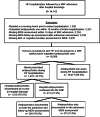New Antipsychotic Prescribing Continued into Skilled Nursing Facilities Following a Heart Failure Hospitalization: a Retrospective Cohort Study
- PMID: 34981366
- PMCID: PMC9550891
- DOI: 10.1007/s11606-021-07233-2
New Antipsychotic Prescribing Continued into Skilled Nursing Facilities Following a Heart Failure Hospitalization: a Retrospective Cohort Study
Abstract
Background: Multimorbidity and polypharmacy are common among individuals hospitalized for heart failure (HF). Initiating high-risk medications such as antipsychotics may increase the risk of poor clinical outcomes, especially if these medications are continued unnecessarily into skilled nursing facilities (SNFs) after hospital discharge.
Objective: Examine how often older adults hospitalized with HF were initiated on antipsychotics and characteristics associated with antipsychotic continuation into SNFs after hospital discharge.
Design: Retrospective cohort.
Participants: Veterans without prior outpatient antipsychotic use, who were hospitalized with HF between October 1, 2010, and September 30, 2015, and were subsequently discharged to a SNF.
Main measures: Demographics, clinical conditions, prior healthcare utilization, and antipsychotic use data were ascertained from Veterans Administration records, Minimum Data Set assessments, and Medicare claims. The outcome of interest was continuation of antipsychotics into SNFs after hospital discharge.
Key results: Among 18,008 Veterans, antipsychotics were newly prescribed for 1931 (10.7%) Veterans during the index hospitalization. Among new antipsychotic users, 415 (21.5%) continued antipsychotics in skilled nursing facilities after discharge. Dementia (adjusted OR (aOR) 1.48, 95% CI 1.11-1.98), psychosis (aOR 1.62, 95% CI 1.11-2.38), proportion of inpatient days with antipsychotic use (aOR 1.08, 95% CI 1.07-1.09, per 10% increase), inpatient use of only typical (aOR 0.47, 95% CI 0.30-0.72) or parenteral antipsychotics (aOR 0.39, 95% CI 0.20-0.78), and the day of hospital admission that antipsychotics were started (day 0-4 aOR 0.36, 95% CI 0.23-0.56; day 5-7 aOR 0.54, 95% CI 0.35-0.84 (reference: day > 7 of hospital admission)) were significant predictors of continuing antipsychotics into SNFs after hospital discharge.
Conclusions: Antipsychotics are initiated fairly often during HF admissions and are commonly continued into SNFs after discharge. Hospital providers should review antipsychotic indications and doses throughout admission and communicate a clear plan to SNFs if antipsychotics are continued after discharge.
Keywords: antipsychotic agents; heart failure; hospitalization; nursing homes; older adults.
© 2021. Society of General Internal Medicine.
Conflict of interest statement
The authors declare that they do not have a conflict of interest.
Figures
Similar articles
-
Acute Antipsychotic Use and Presence of Dysphagia Among Older Veterans with Heart Failure.J Am Med Dir Assoc. 2023 Sep;24(9):1303-1310. doi: 10.1016/j.jamda.2023.06.009. Epub 2023 Jul 18. J Am Med Dir Assoc. 2023. PMID: 37478895 Free PMC article.
-
Delirium and Functional Recovery in Patients Discharged to Skilled Nursing Facilities After Hospitalization for Heart Failure.JAMA Netw Open. 2021 Mar 1;4(3):e2037968. doi: 10.1001/jamanetworkopen.2020.37968. JAMA Netw Open. 2021. PMID: 33724390 Free PMC article.
-
Outcomes in heart failure patients discharged to skilled nursing facilities with delirium.ESC Heart Fail. 2022 Jun;9(3):1891-1900. doi: 10.1002/ehf2.13895. Epub 2022 Mar 15. ESC Heart Fail. 2022. PMID: 35293145 Free PMC article.
-
Heart failure and skilled nursing facilities: review of the literature.J Card Fail. 2012 Nov;18(11):854-71. doi: 10.1016/j.cardfail.2012.09.006. J Card Fail. 2012. PMID: 23141858 Review.
-
Skilled Nursing Facility Care for Patients With Heart Failure: Can We Make It "Heart Failure Ready?".J Card Fail. 2016 Dec;22(12):1004-1014. doi: 10.1016/j.cardfail.2016.10.009. Epub 2016 Oct 18. J Card Fail. 2016. PMID: 27769909 Free PMC article. Review.
Cited by
-
Agreement of Antipsychotic Use between Nursing Home Electronic Records and Minimum Data Set.J Am Med Dir Assoc. 2024 Apr;25(4):606-609.e1. doi: 10.1016/j.jamda.2023.07.005. Epub 2023 Aug 10. J Am Med Dir Assoc. 2024. PMID: 37573885 Free PMC article. Clinical Trial.
-
Health Outcomes of Discontinuing Antipsychotics After Hospitalization in Older Adults.JAMA Psychiatry. 2025 Jul 1;82(7):671-680. doi: 10.1001/jamapsychiatry.2025.0702. JAMA Psychiatry. 2025. PMID: 40366701
-
Antipsychotic Medication Use Among Newly Admitted Long-term Care Residents During the COVID-19 Pandemic in Canada.Health Serv Insights. 2024 Nov 29;17:11786329241300827. doi: 10.1177/11786329241300827. eCollection 2024. Health Serv Insights. 2024. PMID: 39619866 Free PMC article.
-
Acute Antipsychotic Use and Presence of Dysphagia Among Older Veterans with Heart Failure.J Am Med Dir Assoc. 2023 Sep;24(9):1303-1310. doi: 10.1016/j.jamda.2023.06.009. Epub 2023 Jul 18. J Am Med Dir Assoc. 2023. PMID: 37478895 Free PMC article.
References
-
- Orr NM, Jones CD, Daddato AE, et al. Post-acute Care for Patients with Heart Failure. Curr Cardiovasc Risk Rep. 2018;12(18).
Publication types
MeSH terms
Substances
Grants and funding
LinkOut - more resources
Full Text Sources
Medical
Research Materials
Miscellaneous


